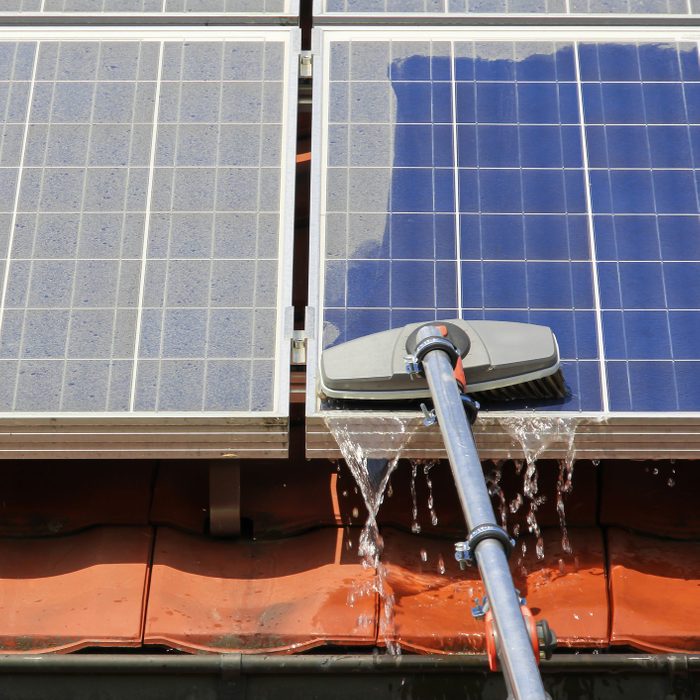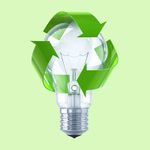Solar Panel Maintenance Guide

From droughts to blizzards, here's how to keep your residential solar panels performing at their peak.
Solar panels are tough. A few years ago the Denver area experienced the most damaging hail storm in its history, yet the National Renewable Energy Laboratory and its 3,000-panel array escaped with only one cracked panel. More than 150,000 vehicles scarred by the golf-ball-size hail weren’t so fortunate.
While residential solar panels can withstand some force, they do sometimes break. They also require maintenance to keep up their efficiency and prolong their lifespan. Here’s how to keep yours in tip-top shape.
On This Page
What Is Solar Panel Maintenance?
Solar panel maintenance includes cleaning the glass and periodically inspecting wires to be sure they aren’t exposed or deteriorating. Conditions to keep in mind include:
- Dust and stains: Solar panels accumulate film on their glass over time, reducing efficiency.
- Debris: Branches and leaves left by storms also reduce efficiency. “After a while, those can also create hotspots, causing panels to overheat,” says Yi Li, founder and CEO of Renogy, a renewable energy company.
- Snow and ice: Accumulation on panels can cause under-cooling, which creates micro-cracks.
How Often Do Solar Panels Need Maintenance?
How often you need to clean your panels depends on their slope and the amount of dust and rain you get. Manufacturers recommend one to four times a year. But depending on your circumstances, you might get away with less effort.
“Really, the only thing I’ve done with my solar panels over the past five to six years is weed control around them, “says Carson Toews, general manager of SolarSet in Center, Colorado.
“They are angled at about 35 degrees, so the snow sheds pretty well. And even in our driest months, I don’t bother cleaning the dust off of them because it doesn’t seem to accumulate.”
Even if you’re feeling lazy about maintenance, check the system’s performance on your monitoring system periodically, and run a system diagnostic if it drops suddenly.
Solar Panel Cleaning: Dust and Debris
Start with a leaf blower or water hose. That will remove most of the debris and probably a lot of the dust. Do not use a high-pressure nozzle or pressure washer, which could damage the panel cover.
If your panels still seem dusty, clean them with a microfiber cloth, glass cleaner and water. Never use abrasive cleaners or materials.
Solar Panel Cleaning: Snow and Ice
If your panels are installed at a steep angle, they should shed snow quickly enough. Otherwise, it’s prudent to brush them off after significant accumulation. During prolonged storms you might have to do this daily, especially if you rely on your system for all your power. This is more challenging because you’re working in cold and slippery conditions.
Li recommends pouring lukewarm water on your panels. Be sure it’s not hot water, which can cause them to crack. Slowly rinse away then snow build-up, then squeegee away any residue so it doesn’t refreeze.
“While a thin frost won’t block out sunlight, it will diminish the system’s efficiency,” Li says.
Common Solar Panel Repairs
Weather and flying debris can crack solar panel glass. Panel electronics can also fail when arc and ground faults or power surges damage the circuitry. But Toews says all these problems are rare.
“SolarSet has only had to replace one broken panel, and it was caused by the customer hitting it with something and cracking it,” he says.
Can Broken Solar Panels Be Fixed?
Sometimes, but often replacing the panel is the most economical solution. If it can be repaired, that’s generally done off-site.
For most problems, DIY repairs are not recommended, since these can lead to more costly problems. “I’ve seen homeowners try to re-seal cracked glass on panels,” Li says. “But if water still sneaks in, it can cause electrical problems that lead to bigger issues down the line.”
What Is the Cost of Maintaining and Repairing Solar Panels?
Maintaining solar panels is free, assuming you own a garden hose or leaf blower. You can also hire a service to do it, which will likely cost around $150 depending on your area. You should also pay for an annual inspection, which varies by location but will likely also cost around $150.
Repair costs are less easy to estimate, range from less than $100 to thousands of dollars, depending on the issue. “There’s a lot of uncertainty, as this mostly depends on whether there’s damage from a storm or other incident,” says Li. Homeowners insurance often covers damage. Ask your insurance carrier if you need a rider to your existing policy.
How Long Do Solar Panels Last?
Technically, the panels can last up to 50 years. But because their performance diminishes every year, they should be replaced after 25 to 30 years. By then, they’ll be around 20 percent less efficient than they were new.
Solar Panel Warranties
Most solar panels come with a materials-and-workmanship warranty of five to 10 years, plus a performance warranty based on their efficiency degradation rate. Look for panels with an 80 percent output guarantee at 25 years.
“I have never seen a performance warranty get used,” says Toews. “And even if it was to be, the warranty process would likely be very cumbersome to go through. But seeing that a solar panel manufacturer is willing to warranty their product for 25 years is a sign of quality.”
Toews also often gets asked if warranties cover hail damage. No, they don’t. But your homeowner’s policy might. When you install a solar system, ask your carrier about adding coverage for it.
What To Do With Unusable Solar Panels
Many components of solar panels are recyclable, including the frames and glass. Check with the recycling center in your area to see what they accept, and whether you need to disassemble the panels before dropping them off. Otherwise, because they can contain small amounts of toxic metals like lead and cadmium, you should dispose of them at a hazardous waste disposal center.
The Environmental Protection Agency (EPA) has additional recommendations for solar panel recycling.
“Recycling is a big topic with solar panels, but it isn’t a matured industry,” says Toews. “I believe in the future we will see better provisions for proper disposal on a small scale that homeowners can use.”



